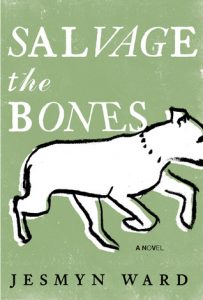Posted on behalf of students in ENGL 350: 21st Century African-American Literature
Location: Literatures and Languages
Call Number: PS3623.A7323 S36 2011
Location: Residence Hall Florida Ave Circulating Collection
Call Number: 813 W2132sa
Jesmyn Ward’s Salvage the Bones illustrates one family’s experience of Hurricane Katrina in the days surrounding the disaster. Each of the twelve chapters conveys the events of a single day, as told from the perspective of Esch, a fifteen year-old-girl living in Mississippi with her daddy and teenage brothers. Ward begins by writing of the family’s dog, China, giving birth. Throughout the novel, China is a significant figure, as she is so important to the family. When one of her puppies falls ill with Parvovirus, Skeetah, Esch’s brother, devises a way to steal medicine from the white neighbors. When the family’s house floods and they are forced to swim to a nearby higher house, China comes loose and gets lost in the water, devastating the family. Throughout the novel, Esch is also dealing with a problem of her own: she is pregnant with her brother Randall’s friend, Manny’s, child. At only fifteen years old, and emotionally invested in her casual relationship with him, she is terrified. By the end of the novel, Daddy has found out and eventually vows to care for Esch and her unborn child. The story concludes with the calming of Katrina, the family returning home, shocked by the damage to their community, and anxiously await for China to return to them.
This work conveys the struggles brought on by a natural disaster, while relating it to race and family. As Esch deals with her pregnancy, she is reminded of the loss of her mother at a young age, especially being surrounded by only males. Her attachment to China, a new mother, is revealing of this. Ward also demonstrates how race is a factor in the face of tragedy. The boys are forced to steal from the white neighbors in order to care for the sick puppy. This novel is important particularly when considering it in the context of how black people’s Hurricane Katrina experience compared to white’s. Black neighborhoods received less and slower aid in the midst of it, and also received less attention in the recovery process following. By conveying the story of one family in the days surrounding the disaster, Ward provides a more intimate look into the effects of this on a personal level. Salvage the Bones is a very powerful and compelling novel that explores a black family in poverty and their efforts for survival throughout obstacles such as pregnancy, and Hurricane Katrina. One should read this book to better understand minority groups, and their disadvantages within the socioeconomic sphere. Esch’s family shows how to overcome the struggle and persist when times are tough in order for survival. For example, Esch and her brother must go out of their way to allow their dog’s offspring to survive in order for them to sell the babies to collect money to get by, as well as going through the house and property of a “white” household to collect materials for survival. This book is useful in the sense that it teaches about motherhood as Esch must cope with becoming a mother, all while having an absent father, a mother who passed away, and being treated poorly by her baby’s father. The audience along with Esch are able to learn about motherhood through their dog China. This is useful because China teaches us that one of the most important aspects of motherhood is the protection of one’s children from the violence that the outside world may bring. We even see China become stronger and more violent after delivering her babies. China does whatever she can to protect her offspring, even chasing after them to find and save them during a very dangerous, level 5 hurricane. This novel allows the audience to gain the perspective of an African American family who must deal with a natural disaster, when they are already struggling on a daily basis, as well as giving the readers a sense of gratefulness for what they do have in life.
I thought that this novel was really interesting because it allows the readers to explore the intersectionality of Esch’s character, as an impoverished black female. As a part of more than one minority groups, it helped me to better understand that Esch is dealing with a lot on her plate. She deals with helping her family get by financially, the struggles of being black in White America, the obstacles that come along with being a female who is constantly surrounded by men, on top of trying to be a teen girl at the same time. I was personally quite struck by the relationship between Esch and Manny, and more specifically the way in which Manny treats Esch. From the start, I empathized with Esch because of her love for Manny, which was unreciprocated, except for the purposes of sexual relations for his benefit. On top of all of Esch’s struggles, having a trusting and loving romantic relationship would surely assist her along the way. However, his coldness towards her just adds to the pain and sadness in which she must deal with. I began to really dislike Manny’s character after the moment where he discovered that Esch was pregnant. Instead of helping her cope with the emotional and physical pain that comes with pregnancy, he got angry with her and even called her a “slut,” diminishing her as a woman. This stuck out to me because unfortunately this is a disgusting situation that happens quite often in with teen pregnancy, where the male figure takes control of the power dynamic in the relationship, leaving the woman to feel worthless about themselves. It greatly saddened me how Esch still blamed herself after Manny refused to take part of the responsibility for getting Esch pregnant. She refers to the situation in a way in which she has failed to get Manny to fall in love with her, however, I feel that his mistreatment of her as a woman and as his baby’s mother reflects poorly on himself and not her.



